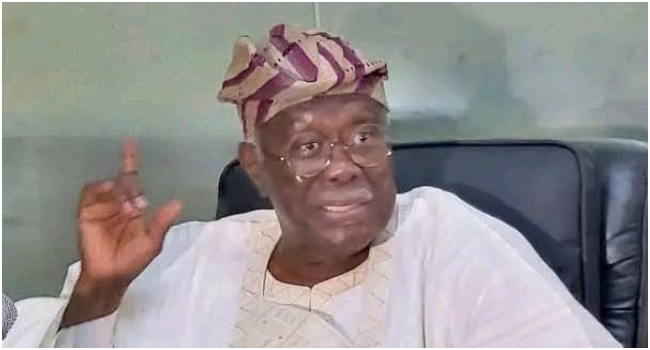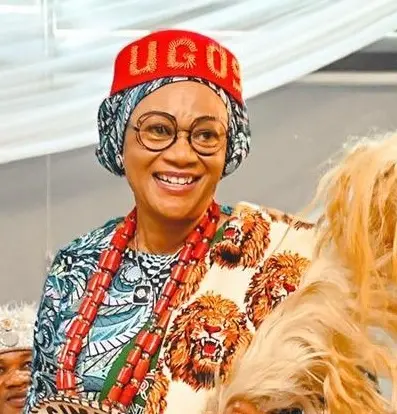Chief Olabode George, a politician who has seen it all, is blunt as blunt could be.
As a retired military General he has seen the inside and outside of power been a former state Governor and aide to the late General Oladipo Diya, a former Chief of staff, Supreme headquarters.

Since he joined partisan politics he has remained consistent as a member of the now leading opposition party, the Peoples Democratic Party, PDP, where he rose to become Deputy National Chairman and has remained in the party since.
He also choose to remain when co-founders and other prominent figures has jumped ship as the fortunes of the party came down after it lost power at the centre in 2015.
He once looked eye-ball-to-eye-ball with a former vice president, Atiku Abubakar and told him that there is no vacancy for a Northerner in Aso rock in 2027.
Thus, when last week as the Chairman of the 9th Annual Conference of the Guild of Corporate Publishers, GOCOP, he spoke on the Theme: Reconciling Campaign Promises with Governance Realities: Challenges and Prospects, he called on First Lady, Senator Remi Tinubu that she should divert the over N20 billion realised from the relaunch of the National Library project, Abuja on September 21, 2025, into building of skill acquisition centres all over the country, he knew what he was saying.
As for Chief George, the priority of the country now should be how to take away young jobless people from the streets and give them skills to reduce unemployment ravaging the nation which 65% of the 220 million population is made up of youths.

The money he said could build at least 100 technical colleges and skill acquisition centres all over the country where unemployed youths could learn one vocation or the other to earn a living.
The story of educational development in Nigeria has change since the early 70s when attention shifted from acquiring skills to white collar jobs.
Today, 1,962, 364 students are in our various 292 Federal and state universities studying one course or the other.
This figure is according to Nigeria Universities Commission, NUC, is made up of 72 federal, 67 state and 153 private Universities.
These students will in the next four years join the saturated unemployment market in the face of our bad economy.
Since the shift to acquiring university education by the students, production of skilled manpower has reduced significantly such that employing artisans for both private and public concerns have become such a herculean task as idle youths who could not gain admission to our tertiary institution are found all over the country roaming about providing recruitment ground for crime and other anti-social behaviors.
In the absence of skilled artisans many Nigerians now resort to hiring immigrant skilful artisans like Bricklayers, Tilers, Plumbers, etc from neighbouring West African countries like Togo, Ghana and other countries who got their education goals right and reduce gaps or close the gaps in their educational system unlike Nigeria.
At the last count in 2021, the country according to the National Board for Technical Education, NBTE, has only 153 Technical Colleges made up of 150 public and 3 private institutions churning out ill- trained technicians and artisans.
Out of the lot, 33 of such schools are funded by the Federal government, 117 by states and 3 by private individuals.
The NBTE oversees various technical and vocational centres and also accredit our various ill- equiped Polytechnics offering various technical courses.
Today, there are 13.5 million students in various public and private secondary schools all over the country most of them aspiring to acquire university degrees since our educational system places more emphasis on academic cum paper qualifications.
According to the NBTE only 10% of students in secondary schools churned out every year are interested in enrolment in the few Technical and vocational centres in the country.
Yes, noble as the intention of Senator Remi Tinubu is, large chuck of this humongous money donated within hours should be used to establish more technical and vocational centres all over the country to take our idle youths out of the street and reducing dependence on imported skills from neighbouring countries with its security implications.
The First Lady should also conduct enough research and studies to identify whether the National Library would attract readers who seek knowledge and information.
Yours faithfully can confirm that as a primary school student in the late 60s, we were made to spend at least a day in the public library run by the Egba Native Authority or whatever name it is called then.
The library was situated not more than 500 meters from my school.. African Church Primary School, Ita Iyalode, Abeokuta.
At the end of our visit, each pupil could borrow one or two books to read and return a week later.
Today, the library has disappeared.
Also during my secondary school days many of such public libraries could be found in several locations in the town, now the capital of Ogun State.
Also in my alma mater, the African Church Grammar School, students are encouraged to visit our well stocked library where Daily newspapers-at least eight, during their free periods to read and get acquainted with the broader knowledge outside the four walls of their classroom.
Today, it is doubtful whether both primary and secondary schools in the country has such luxury.
Establishing skill acquisition centres at least ten in each states of the Federation to absorb products of secondary schools who could not gain admission to our various theory based technical colleges will go a long way in closing the gaps in our educational system, provide opportunities for idle youths to either be skilfully employed or had access to seed money to set up on their own and become employers of labour.
Such skill acquisition centres should be complemented with funds from the newly established Credit Corporation-a new initiative of the President Bola Tinubu led administration.
In other words a synergy should be established between the various technical, vocational and skill acquisition centres to give loans to start-up to be self-employed and be employers of labour.
The message sent by Chief Bode George, an elder statesman and experienced administrator should not be seen as coming from opposition but wise counsel such that such money realised from the launch should be used to fill the yawning gaps in our educational system with the resultant effect of churning out vibrant youths who could directly contribute to our Gross Domestic Product, GDP by deploying their skills for personal and national economic benefits.
It is a known fact that reading culture could not be nurtured in gilded cages or giant structures made only for the elite as experience has shown over the years with the National Library project.
While it is laudable that our First Lady chooses to breathe life into our learning process by reviving a project initiated by the Late Second Republic President Shehu Shagari, the reality of the moment and our emergent challenges call for rethinking on the scope and intention of such projects.

